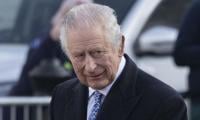WASHINGTON/ISLAMABAD: The IMF has reaffirmed its support for Pakistan’s economic reforms agenda hours after Finance Minister Muhammad Aurangzeb met with senior US officials, including Assistant Secretary of State Donald Lu.
“I think what is important at this stage is to accelerate the reforms, double down on the structure of reforms in order to provide Pakistan with its full potential of growth,” cautioned the Fund’s Middle East and Central Asia Director, Jihad Azour, during a press conference on Thursday.
Mr Azour said the current programme that was initiated 10 months ago allowed Pakistan to achieve a certain number of important milestones and terms of economic stability. The last review was successful and will be forwarded to the board which will end a programme that helped Pakistan address acute economic imbalances and maintain its economic stabilities, those measures also allowed backstand to increase its buffers.
He said currently the authorities have expressed interest in a new programme, in order to help Pakistan address some of the key challenges and what are those challenges: one is to preserve microeconomic stability and this would require to continue the work on fiscal side in order to reduce the level of budget deficits, strengthen the physical situation by improving the revenue situation, which was one of the main challenges in the past, increasing revenues will allow the government not only to address that situation but also to have the room to provide additional social support.
“The second pillar is the reform of the energy sector and this is a priority that has been there for some time but it’s still an important reform dimension for Pakistan. Three is to increase the potential of this economy to grow. Pakistan is a large economy with a large potential. Leveling the playing field, improving business environment, allowing the private sector to be having more space internally and also on the expert side will help Pakistan. “Those are the key pillars that Pakistan would need in order to improve its situation. The Fund is ready to support, and I would say, the package of reform is now more important than the size of the programme, because we saw recently the right measures provided the right response. Markets reaction was positive. We saw additional inflows, reserves have been rebuilt at the level of the Central Bank and even growth prospects have improved.
“I think what is important at this stage is to accelerate the reforms, double down on the structural reforms in order to provide Pakistan with its full potential of its growth. Yes, we have had several programmes but the priorities are still there and therefore the fund is ready to assist when the government asks for that and I think also bilateral partners of Pakistan are looking forward for programme to extend their additional financial support to Pakistan.”
The US State Department officials, including Assistant Secretary Donald Lu and Principal Deputy Secretary Elizabeth Horst, met the finance minister on Wednesday to underline the political will in Washington to strengthen the Pak-US economic relations. Sources have confirmed that the finance minister had a meeting with the US Treasury officials as well.
“During the meeting, we encouraged the government to prioritise and expand economic reforms to address economic challenges,” the State Department spokesperson told The News.
Earlier this week, the State Department had declared that the US support for Pakistan’s economic success was “unwavering”. The minister of finance is in the United States for a part of a series of engagements with not just within the US government interagency but also engaging in with non-governmental organisations, the department’s principal deputy spokesperson Vedant Patel said during the daily press on Thursday, confirming that the finance minister met with senior State Department officials.
The emphasis during the meeting was on upgrading economic partnerships, with special emphasis on alternative energy, agriculture, climate resilience and tech industry, the finance ministry statement said. The finance minister briefed the US officials on Pakistan’s reform agenda encompassing broadening the tax base, streamlining energy sector and fast-tracking privatisation process of state-owned enterprises. He also identified emerging opportunities for American investments in IT, renewables and agriculture and minerals extraction. Pakistan will work closely with the US International Development Finance Corporation and Exim Bank, the minister assured.
He has already announced that the government has kicked off discussions with the IMF for a new and expanded loan programme amounting to $6 billion. The finance minister, in his interview with Bloomberg yesterday, stated that he does not expect significant rupee devaluation as part of negotiations with the Fund for a new loan. “I don’t see the need for any step change,” the Bloomberg report quoted the finance minister. His reason for skepticism, according to him, was solid foreign-exchange reserves, a stable currency, rising remittances and steady exports. “The only thing which can be a wild card, although in our projections we should be OK, is the oil price,” the report quoted him that while massive devaluations had accompanied some of Pakistan’s previous IMF loans and are often a condition of the crisis lender’s programmes around the world, nothing comparable should be necessary this time around. He added that there’d be no reason for the rupee to depreciate more than the range of about 6 percent to 8 percent seen in a typical year.
The finance minister also met Moody’s Investor Service where he shared insights on economic indicators and stabilisation post Stand-by Arrangement with the IMF. He discussed the government’s economic priorities and expressed intent to access international capital markets, focusing on the Middle East and China. He also addressed concerns on inflation, foreign exchange reserves, debt repayments, external account vulnerability and domestic liquidity.
Meanwhile, Saudi Arabia is all set to strike a deal for procurement of stakes in multibillion-dollar Reko Diq project with possible investment of $1 billion. The formal deal is expected within the current fiscal year only after striking the Free Trade Agreement (FTA) with GCC countries, including Bilateral Investment Treaty (BIT) and probably on the occasion of Saudi Crown Prince Mohamed bin Salman’s visit to Pakistan.
The Government of Pakistan and Barrick Gold are expected to offer equal but minority shares to Saudi Arabia’s giant for securing stakes in the range of 10 to 30 percent. It is expected that both sides might offer equal shares to KSA so that the shares of both Pakistan and Barrick Gold remained the same in the Reko Diq.
Meanwhile, Bloomberg on Thursday reported that Saudi Arabia is moving closer to a potential deal to acquire a minority stake in a Pakistan mine controlled by Barrick Gold Corp., people with knowledge of the matter said and quoted by Bloomberg.
Manara Minerals Investment Co., backed by the Saudi sovereign wealth fund, plans to invest at least $1 billion in the Reko Diq copper and gold mining project, the people said. It could announce that it’s reached a preliminary agreement on terms of a transaction as soon as the next few weeks, according to the people.
Police say that ten people were killed in Abuja and “many others” in Okija
Ministry says three drones were destroyed by air defence systems and three others by electronic warfare systems
Sanjoy Roy, 33, lone accused in case, pleads not guilty before judge in closed court in Kolkata
JUI-F chief says talks with government have been positive wherein it admitted that party’s demands were strong
Iran has poor road safety record, with 20,000 deaths reported between March 2023 and March 2024 in road accidents
"Entire nation is united to eliminate every enemy of peace," says Maryam Nawaz







